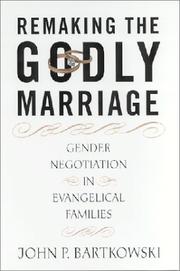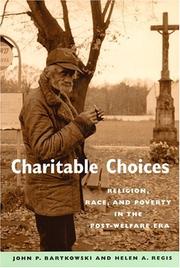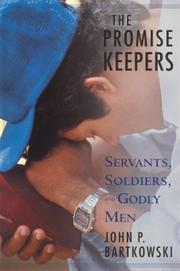| Listing 1 - 8 of 8 |
Sort by
|
Book
ISBN: 0813569265 0813536294 9780813536293 9780813569260 Year: 2004 Publisher: New Brunswick, N.J. Rutgers University Press
Abstract | Keywords | Export | Availability | Bookmark
 Loading...
Loading...Choose an application
- Reference Manager
- EndNote
- RefWorks (Direct export to RefWorks)
Promise Keepers (Organization) --- PK (Promise Keepers) --- Promise Keepers Movement

ISBN: 0813529182 0813529190 Year: 2001 Publisher: London Rutgers university press
Abstract | Keywords | Export | Availability | Bookmark
 Loading...
Loading...Choose an application
- Reference Manager
- EndNote
- RefWorks (Direct export to RefWorks)
John P. Bartkowski investigates the debates over gender and the family as they are manifested within contemporary evangelicalism. The author asks: Have debates over relations between husband and wife been altered by the emergence of new evangelical movements such as the Promise Keepers? And given the fact that leading evangelicals advance competing visions of godly family life, how do conservative religious spouses make sense of their own family relationships and gender identities? Through in-depth interviews with evangelical married couples, Bartkowski reveals how these men and women jointly negotiate gender roles within their families and selectively appropriate values of the larger culture even as they attempt to cope with the conflicting messages of their own faith. (Rutgers UP)
Evangelicalism --- Families --- Sex role --- Religious aspects --- Christianity --- Religious aspects --- Christianity --- United States --- Church history
Book
ISBN: 3319906674 3319906682 Year: 2018 Publisher: Cham : Springer International Publishing : Imprint: Springer,
Abstract | Keywords | Export | Availability | Bookmark
 Loading...
Loading...Choose an application
- Reference Manager
- EndNote
- RefWorks (Direct export to RefWorks)
This volume offers an in-depth examination of a diverse range of faith-based programs implemented in three different geographical locales: family support in rural Mississippi, transitional housing in Michigan, and addiction recovery in the Pacific Northwest (Washington-Oregon). Various types of religious service providers—faith-intensive and faith-related—are carefully examined, and secular organizations also serve as an illuminating point of comparison. Among other insights, this book reveals how the “three C’s” of social service provision—programmatic content, organizational culture, and ecological context—all combine to shape the delivery of welfare services in the nonprofit world. This book warns against simplistic generalizations about faith-based organizations. Faith-based providers exhibit considerable diversity and, quite often, remarkable resilience in the face of challenging social circumstances. An appreciation of these nuances is critical as policies concerning faith-based organizations continue to evolve.
Church charities. --- Social service --- Religious aspects. --- Religious social work --- Charities --- Church and social problems --- Church finance --- Faith-based human services --- Philosophy. --- Philosophy of Religion. --- Mental philosophy --- Humanities --- Religion—Philosophy.

ISBN: 0814723098 1417588144 9781417588145 9780814799017 0814799019 9780814799024 0814799027 9780814723098 Year: 2003 Publisher: New York, NY
Abstract | Keywords | Export | Availability | Bookmark
 Loading...
Loading...Choose an application
- Reference Manager
- EndNote
- RefWorks (Direct export to RefWorks)
Congregations and faith-based organizations have become key participants in America’s welfare revolution. Recent legislation has expanded the social welfare role of religious communities, thus revealing a pervasive lack of faith in purely economic responses to poverty.Charitable Choices is an ethnographic study of faith-based poverty relief in 30 congregations in the rural south. Drawing on in-depth interviews and fieldwork in Mississippi faith communities, it examines how religious conviction and racial dynamics shape congregational benevolence. Mississippi has long had the nation's highest poverty rate and was the first state to implement a faith-based welfare reform initiative. The book provides a grounded and even-handed treatment of congregational poverty relief rather than abstract theory on faith-based initiatives. The volume examines how congregations are coping with national developments in social welfare policy and reveals the strategies that religious communities utilize to fight poverty in their local communities. By giving particular attention to the influence of theological convictions and organizational dynamics on religious service provision, it identifies both the prospects and pitfalls likely to result from the expansion of charitable choice.
Church work with the poor --- Church and social problems --- Public welfare --- Church charities --- Church and the poor --- Poor --- Kairos documents --- Christianity and social problems --- Social problems and Christianity --- Social problems and the church --- Social problems --- Benevolent institutions --- Poor relief --- Public assistance --- Public charities --- Public relief --- Public welfare reform --- Relief (Aid) --- Social welfare --- Welfare (Public assistance) --- Welfare reform --- Human services --- Social service --- Religious social work --- Charities --- Church finance --- Faith-based human services --- Religious aspects --- Christianity. --- Government policy
Digital
ISBN: 9783319906683 Year: 2018 Publisher: Cham Springer International Publishing
Abstract | Keywords | Export | Availability | Bookmark
 Loading...
Loading...Choose an application
- Reference Manager
- EndNote
- RefWorks (Direct export to RefWorks)
This volume offers an in-depth examination of a diverse range of faith-based programs implemented in three different geographical locales: family support in rural Mississippi, transitional housing in Michigan, and addiction recovery in the Pacific Northwest (Washington-Oregon). Various types of religious service providers—faith-intensive and faith-related—are carefully examined, and secular organizations also serve as an illuminating point of comparison. Among other insights, this book reveals how the “three C’s” of social service provision—programmatic content, organizational culture, and ecological context—all combine to shape the delivery of welfare services in the nonprofit world. This book warns against simplistic generalizations about faith-based organizations. Faith-based providers exhibit considerable diversity and, quite often, remarkable resilience in the face of challenging social circumstances. An appreciation of these nuances is critical as policies concerning faith-based organizations continue to evolve.
Philosophy --- Religious studies --- filosofie --- godsdienstfilosofie

ISBN: 0813533368 Year: 2004 Publisher: New Brunswick, NJ Rutgers University Press
Abstract | Keywords | Export | Availability | Bookmark
 Loading...
Loading...Choose an application
- Reference Manager
- EndNote
- RefWorks (Direct export to RefWorks)
Christian Men's Movement --- gender issues --- family --- multiculturalism --- fraternal associations --- sports --- subcultural boundary work --- grassroots social movements --- the Promise Keepers --- PK --- America --- 1990s --- conservative religious values --- conservative social values --- spirituality --- American religion --- religious identity --- Christian manhood --- stadium conferences
Book

ISBN: 9780813546957 Year: 2009 Publisher: New Brunswick, NJ
Abstract | Keywords | Export | Availability | Bookmark
 Loading...
Loading...Choose an application
- Reference Manager
- EndNote
- RefWorks (Direct export to RefWorks)
Book

ISBN: 0813549450 9780813549453 9780813547183 9780813547190 0813547180 0813547199 Year: 2010 Publisher: New Brunswick, NJ
Abstract | Keywords | Export | Availability | Bookmark
 Loading...
Loading...Choose an application
- Reference Manager
- EndNote
- RefWorks (Direct export to RefWorks)
Religion is a major social institution in the United States. While the scientific community has experienced a resurgence in the idea that there are important linkages between religion and family life and religion and health outcomes, this area of study is still in its early stages of development, scattered across multiple disciplines, and of uneven quality. To date, no book has featured both reviews of the literature and new empirical findings that define this area for the present and set the agenda for the twenty-first century. Religion, Families, and Health fills this void by bringing together leading social scientists who provide a theoretically rich, methodologically rigorous, and exciting glimpse into a fascinating social institution that continues to be extremely important in the lives of Americans.
Families --- Medicine --- Health Workforce --- United States --- Religion.
| Listing 1 - 8 of 8 |
Sort by
|

 Search
Search Feedback
Feedback About UniCat
About UniCat  Help
Help News
News